David Harvey Sutton (1918 – 1999) doctor
 He learned to fly, bought three light aircraft, engaged the first of a succession of general practitioners who held pilot’s licences, and in 1976 formed the Australian Inland Medical Service.
He learned to fly, bought three light aircraft, engaged the first of a succession of general practitioners who held pilot’s licences, and in 1976 formed the Australian Inland Medical Service.
Volunteering for service in World War II, Sutton was appointed as a captain, Australian Army Medical Corps, Australian Imperial Force, on 14 May 1943. He served in Papua and New Guinea (July 1943–August 1944) and New Britain (January–November 1945), first with the 4th Field Ambulance then, from February 1944, with the 22nd Battalion. Seeing much action in New Guinea, he was mentioned in dispatches (1946) for his service. In February 1946 he joined the British Commonwealth Occupation Force, Japan. There, he commanded the 20th Field Ambulance (1947–49), as a temporary lieutenant colonel (August 1947). On leave in Australia, he had married Judith Macgregor Watt on 30 December 1946 at St Andrew’s Church of England, Indooroopilly, Brisbane; she joined him in Japan twelve months later. By this time he was styling his surname as Harvey Sutton (sometimes hyphenated); he would later formalise the change by a deed poll (1964). He transferred to the Reserve of Officers on 26 July 1949 in Sydney.
In August that year Harvey Sutton and his wife moved to north-west Queensland, he having been appointed as medical superintendent of the Cloncurry District Hospital, with the right of private practice. He would occupy the post until 1982, except for short periods between 1954 and 1965, when he switched to full-time private practice or acted as locum tenens. On occasional stand-in flights for the Royal Flying Doctor Service of Australia, he observed the lack of primary medical care for residents in remote areas, especially Aboriginal people. He learned to fly, bought three light aircraft, engaged the first of a succession of general practitioners who held pilot’s licences, and in 1976 formed the Australian Inland Medical Service to bring self-flying doctors to small outback centres. The organisation lost money until its incorporation as the Inland Medical Service Ltd and registration as a charity in 1977. Harvey Sutton, who had never sought to profit from the service, took personal responsibility for the earlier losses, amounting to $200,000. With the Federal and State governments prepared to subsidise only the RFDS, the IMS was wound up in 1983, having accomplished much in difficult conditions. Publicity surrounding its work and its demise forced the authorities to improve medical services in isolated communities, achieving its founder’s aim.
By the 1970s Harvey Sutton was involved in dozens of community organisations. He was president (1962–79) and a life member (1966) of the Cloncurry sub-branch of the Returned Sailors’, Soldiers’ and Airmen’s Imperial (Returned Services) League of Australia; president (from 1967) of the Cloncurry Art Society; chairman of the historical and literary sub-committee of the Cloncurry Centenary Celebrations Committee, which published Cloncurry 100: 1867–1967; a founder (1970) and patron of the Mitakoodi Housing Co-Operative Society Ltd (later Aboriginal Corporation); a supporter (from 1978) of the Kalkadoon Aboriginal Sobriety House, Mount Isa; and a member (from 1960) and Paul Harris fellow (1980) of the Rotary Club of Cloncurry. In addition, he was a Cloncurry Shire councillor (1952–79). Having been a lay reader (1957–77) at St Andrew’s Anglican Church, Cloncurry, he was made a deacon in 1978 and ordained as a priest on 29 June 1979, thereafter serving part time as assistant priest in the Cloncurry and Julia Creek parishes.
https://adb.anu.edu.au/biography/harvey-sutton-david-32217
____
Leave a Reply, comments are welcome.